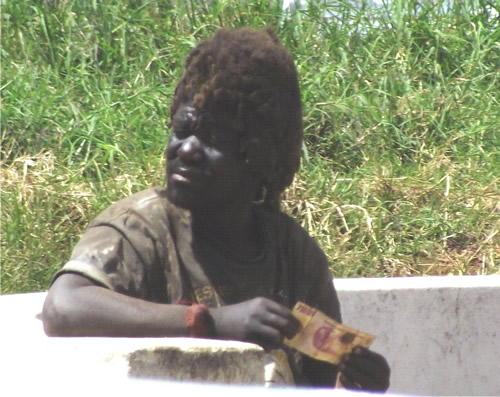My Zimbabwe is about all the unemployed young people who make it happen, against the odds, and do it with innovative style. It is the young woman, pictured recently in a weekly publication, who needs to make a living to raise her daughter but is unable to afford a babysitter. So everyday she takes the toddler with her to work and places the girl in an enormous cardboard box. While the mother sells her wares at the corner of a busy city street, she keeps an eye on her child who frolics about in the safety of her makeshift playpen.
Despite the harsh economic conditions and the uncertain political future, Zimbabweans still have the spirit of ”Ubuntu”. My Zimbabwe is a country in which women came to assist during our bereavement in early March in Bulawayo. They cooked for others on a fire in the blistering heat, washed all the plates and still had the energy to go back and do their household chores. The men braved the evening chill to keep my brother and cousins company. These people were saying to my family: ‘‘we cannot reverse your loss but we are here for you, we share in your grief.” It is this spirit of ”Ubuntu” that makes me proud to be Zimbabwean. No matter how bad things may get, our neighbours and others around us are there for us, they give us shoulders to cry on. The mere feeling of belonging makes each day easier to bear.
My Zimbabwe is the young man who offers me his seat in a bus from Kwekwe to Harare because I am pregnant and he stands all the way to Kadoma. It is the police officers and the eyewitnesses, both men and women, who rush to the scene of the accident without protective gloves to assist the injured before the ambulance arrives.
It is a politician who decentralised education from the scenario of the pre-Rhodesia era by establishing day secondary schools to equip black children with literacy. My Zimbabwe is a local legal practitioner who defended the hairstyle which those pre-independence, half pint advocates said was illegal to sport when attending the House of Assembly. Let’s face it, constitutionally; a hairstyle is of no importance in the House.
The women who in their diversity tirelessly contribute to family, community and national development despite being marginalized, embody my Zimbabwe. They always ensure that there is food, water, love and care at home even in times of power and water cuts or any social, economic and political crisis.
It is a country where the literacy rate is very high meanwhile teacher wages are some of the lowest in the region. From tattered uniforms in rural areas, we produce internationally recognised graduates yearly.
My Zimbabwe is the street vendor in Victoria Falls who wanted to pay me for the airtime I didn’t need and was trying to give to her. The political leader who had the courage to try to work with the people who had beaten him close to death. The people who voted for change in 2005 and 2008 when they knew they could suffer for their stand for freedom in their country. And apart from all that, my Zimbabwe makes the best cakes in the world in the Vumba.
It is the people in Gutu South whose families were decimated at an attack during a pungwe in the 1970s at Kamungoma Farm. (More than 50 were killed in one night.) They have kept on going, with their physical and emotional wounds, without asking for compensation or sympathy from anyone, let alone the government. They took it that the liberation struggle was for us all.
It is a woman called Precious Nyamukondiwa who runs a small organisation in Chinhoyi. She and her colleagues have gone a long way in assisting people living with HIV/AIDS. Their work has long gone unnoticed while affected and infected little children have been taught ways of positive living. It is Mai Zenda, a volunteer at Felly’s Orphanage at Stodart Hall in Mbare. Felly’s orphanage is a place where orphans in Mbare are fed one meal a day. These orphans live with their relatives who are too poor to feed them. Mai Zenda currently cooks for an average of 69 children from Monday to Friday all on her own. If there is no relish, she goes to Mbare musika to ask on behalf of the orphans. She has been a volunteer there for 4 years for no income. Mrs Zenda is determined to support these children as best she can.
My Zimbabwe can certainly look bleak on the surface but a closer look shows a myriad of rainbows. It is a place where black people have discovered the value of entrepreneurship. Everyone is thinking of how to set up a business whether informally or formally. We have started changing the colonial mindset where we were groomed to be worker bees that strive for someone else.
My Zimbabwe is the once a year visit to Honde Valley in the Eastern Highlands. Eating bananas, roasted maize cobs, pineapples and mangoes in my grandparents homestead.
It is a place where you can send children to school on their own and not have to worry about kidnapping and abuse. A place where they can go about visiting their friends and being children without having to grow up too fast for their age.
My Zimbabwe is a place where we have time to stop talk and enjoy meeting friends and family in the streets because we still hold relationships dear and understand the value of maintaining them.
This article was co-authored by Zimbabweans believing in the positive: Thandi, Yeukai, Cherish, Sally, Peter, Ethel, Farai, Donald, Chirikure, Tabitha and Nomqhele










